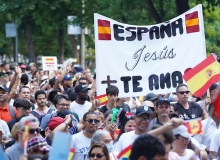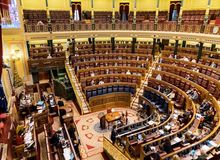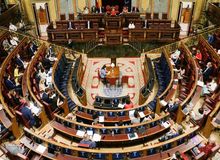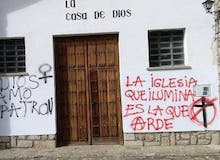


The media and religious entities (including evangelicals) take a stand on a measure that directly affects Muslim celebrations in the southeastern Spanish town.
.jpg)
The ruling party explicitly targets “priests, pastors of cults and coaches” as examples of those who could be committing a crime against LGBTQI people.

The regional government of Madrid hosted an institutional event, recognising the “added value” that evangelicals bring to society.
.jpg)
Just over 1% of the votes separates the People’s Party and Prime Minister Sánchez’s Social Democrats. Catalan and Basque nationalists will have the key of the government.

Speaking to a Christian a reporter, the PSOE praised the work of evangelical churches among migrants, the PP valued their dialogue, and Vox spoke of their moral coherence and ability to create strong communities.

The few religious references of the four main parties standing for election on 23 July show distinct differences in their approach to religion.

The government party drives the conversation about abolition. Evangelicals hope such a law will move forward, but demand a deeper social change.

The government wants to present a freedom of conscience bill this year, but social actors (including evangelicals) are not convinced about changing the religious freedom law.

The Parliament passes the law with a majority of 198 votes. Dozens protested outside. Spain becomes the fourth European country and the sixth in the world to approve euthanasia.

The amendments of the opposition parties have been rejected. “Such a sensitive issue needs a broad social and political consensus”, the Spanish Evangelical Alliance says.

A 2019 report of the Observatory for Religious and Conscience Freedom warns that the violent attacks against places of worship have increased.

The draft law proposes euthanasia in a month for those with an incurable or disabling illness. Spanish evangelicals ask for “better palliative care and support for people in dependence”

Far-right party Vox more than doubles its support and becomes third party in the Spanish parliament. Catalan and Basque pro-independence groups also celebrate gains.

“This decision marks an end to the moral insult that the public glorification of a dictator constitutes”, said the President of Spain, Pedro Sánchez. Under Franco, evangelicals were isolated, silenced and incarcerated.

The high turnout (76%) punished the conservative People's Party. New far-right party Vox enters parliament but will not be able to influence government.

Andalusia, the biggest Autonomous Community of Spain, gives nationalist party Vox 400,000 votes and 12 seats in its regional Parliament.

The Spanish Evangelical Alliance says in a statement that the draft law is “in fact, an assisted legal suicide, wich does not respond to common situations of severe suffering”.

The no-confidence motion has passed with the support of 180 MPs. There was one abstention and 169 MPs voted against it.

Assiste suicide is supported by a larga majority of the Congress. In 2011, the Evangelical Medical Union sent a report on euthanasia to the government.

The majority of the political parties voted in favour of the Bill that could endanger religious freedom. The ruling Conservatives (PP) confirmed their abstention.

The PM gets one third of the votes and widens the distance with the Leftist parties. Agreement with other parties is still needed to end the half-year long political deadblock.

The results of the Spanish elections demand a deep change in the way of understanding politics.

Emergent parties Podemos (left) and Ciudadanos (centre-right) get one in three votes. No clear government for the first time in democracy.

New parties Ciudadanos and Podemos share their views about religious freedom and minorities. They would end the privileges of the Roman Catholic Church.

The Spanish Christian association Diaconia, organised a seminary about human trafficking for sexual exploitation. Representatives of all political parties debated about prostitution.

Las opiniones vertidas por nuestros colaboradores se realizan a nivel personal, pudiendo coincidir o no con la postura de la dirección de Protestante Digital.